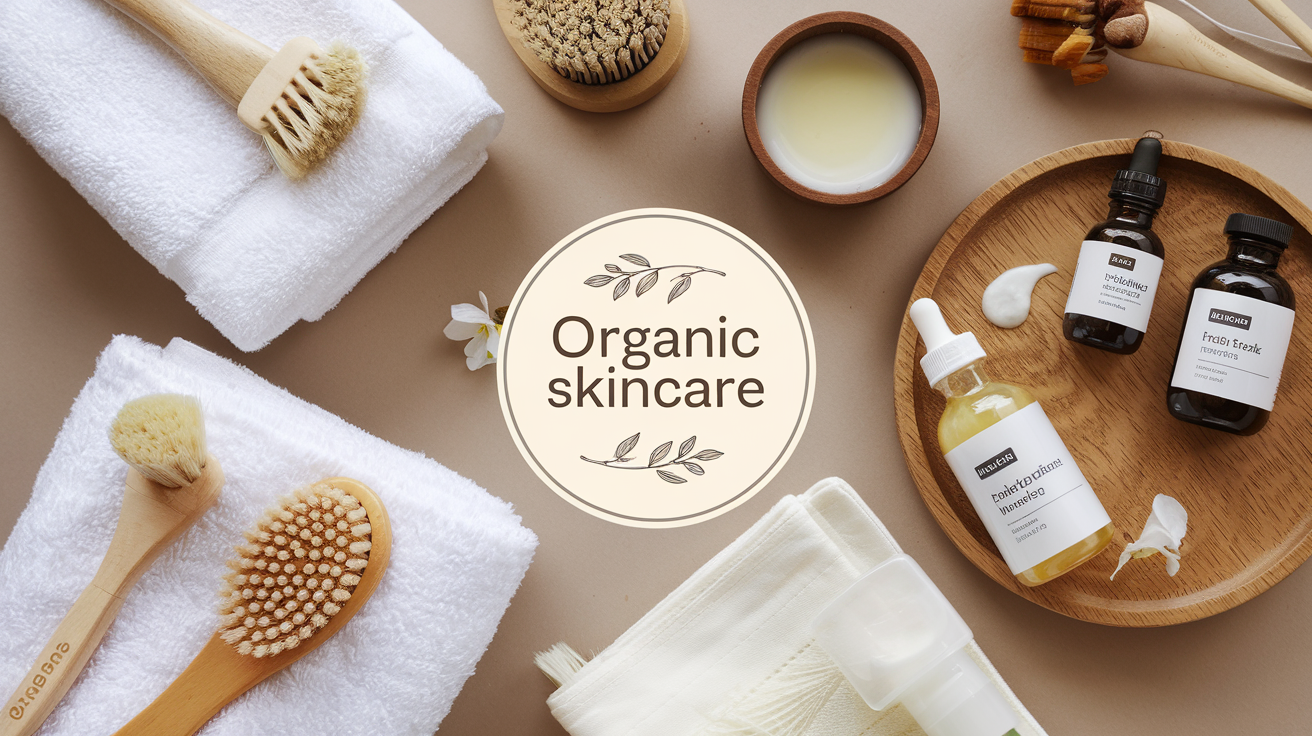We all want to look and feel our best but the beauty products we use can significantly impact our health and the environment. That's why more people are turning to organic beauty alternatives that harness nature's power without harmful chemicals or synthetic ingredients.
When we choose organic beauty products we're not just making a safer choice for our skin. We're also supporting sustainable practices that protect our planet. From nourishing facial oils to gentle cleansers made with pure botanical ingredients these products offer benefits that go far beyond surface-level beauty. Natural ingredients like aloe vera coconut oil and green tea provide potent antioxidants while working in harmony with our body's natural processes.

Understanding Organic Skincare
Organic skincare products contain ingredients grown without synthetic pesticides fertilizers or genetically modified organisms. These certified organic products maintain strict standards throughout their cultivation processing manufacturing.
What Makes a Beauty Product Organic?
Organic beauty products contain ingredients grown using natural farming methods that exclude synthetic pesticides hormones antibiotics. For certification a product must include 95% organic ingredients derived from plants minerals or other natural sources. The remaining 5% consists of approved natural preservatives essential for product stability safety. Common organic ingredients include:
- Botanical extracts like aloe vera chamomile green tea
- Cold-pressed oils such as coconut jojoba argan
- Natural vitamins A C E from plant sources
- Organic honey beeswax essential oils
- Mineral-based ingredients like zinc oxide titanium dioxide

The Rise in Popularity of Organic Skincare
The organic skincare market has experienced significant growth driven by increased awareness of ingredient safety environmental impact. Consumer demand stems from:
- Growing concerns about synthetic chemicals in traditional products
- Enhanced transparency in beauty industry labeling
- Rising preference for cruelty-free sustainable options
- Social media influence highlighting clean beauty benefits
- Ingredients: Organic products use natural ingredients while conventional ones contain synthetic chemicals
- Production: Organic farming practices avoid pesticides while conventional methods use chemical fertilizers
- Preservation: Natural preservatives replace parabens synthetic preservatives
- Environmental Impact: Organic production creates less environmental pollution supports biodiversity
- Certification: Organic products require strict certification conventional products don't
- Cost: Natural ingredients command higher prices due to cultivation processing methods

5 Benefits of Using Organic Skin Care Products
Organic skincare products offer significant advantages for skin health through their natural ingredients and sustainable production methods. Here's how switching to organic beauty products transforms your skincare routine.
1. Free from Harsh Chemicals
Organic skin care products eliminate exposure to synthetic ingredients such as parabens, phthalates, sulfates or artificial fragrances. These products contain certified organic ingredients grown without pesticides, ensuring your skin absorbs only pure, natural compounds. Traditional beauty products often include harmful chemicals that can accumulate in body tissues over time.
2. Gentle on Sensitive Skin
Organic skincare provides excellent compatibility for sensitive skin types through natural ingredients like aloe vera, chamomile or calendula. These products reduce the risk of irritation, redness or allergic reactions common with conventional beauty products. Natural moisturizers such as organic coconut oil or jojoba oil maintain skin hydration without clogging pores.

3. Helps Prevent Premature Aging
Natural antioxidants in organic skincare products combat free radical damage that leads to premature aging. Ingredients like vitamin C, vitamin E or green tea extract protect collagen production while supporting skin regeneration. Cold-pressed organic oils deliver concentrated nutrients that maintain skin elasticity and reduce fine lines.
4. Environmentally Friendly
Organic farming practices protect ecosystems by avoiding synthetic pesticides and fertilizers. Clean beauty products use biodegradable ingredients and eco-friendly packaging materials. Choosing organic skincare supports sustainable agriculture and reduces environmental pollution from chemical manufacturing processes.
5. Packed with Natural Nutrients
Organic products contain higher concentrations of beneficial compounds compared to conventional alternatives. Essential vitamins, minerals and antioxidants from plant-based sources provide complete skin nourishment. Natural ingredients like organic honey, rosehip oil or sea buckthorn deliver multiple active compounds that work synergistically for optimal skin health.

|
Organic Ingredient |
Key Benefits |
|
Aloe Vera |
Soothes inflammation, hydrates |
|
Green Tea Extract |
Antioxidant protection, anti-aging |
|
Coconut Oil |
Moisturizes, antimicrobial properties |
|
Vitamin E |
Repairs skin damage, prevents aging |
|
Organic Honey |
Antibacterial, healing properties |
Why Choose Organic Beauty Products?
Organic beauty products offer a safer alternative to conventional cosmetics by combining natural ingredients with sustainable production methods.
Benefits of Organic Skin Care for Everyday Use
Organic skincare products integrate seamlessly into daily routines, delivering consistent benefits:
- Natural ingredients like aloe vera vitamin E provide gentle yet effective cleansing
- Certified organic products maintain skin's natural moisture balance without mineral oils
- Clean beauty formulations support a sustainable skincare routine
- Cruelty-free testing ensures ethical product development
- Organic moisturizers work in harmony with different skin types
How Organic Skincare Products Enhance Skin Health
Organic skincare promotes optimal skin function through nutrient-rich formulations:
- Antioxidant-rich ingredients protect against environmental damage
- Natural vitamins nourish the skin's barrier function
- Organic farming methods preserve beneficial compounds in ingredients
- Plant-based nutrients improve skin texture without synthetic additives
- Clean products support the skin's natural healing processes
Avoiding Harsh Chemicals for Long-Term Benefits
Choosing organic beauty products eliminates exposure to harmful substances:
|
Common Harsh Chemicals |
Organic Alternatives |
|
Parabens |
Organic Essential Oils |
|
Phthalates |
Plant-Based Extracts |
|
Synthetic Fragrances |
Natural Botanicals |
|
Petroleum Products |
Cold-Pressed Oils |
|
Artificial Preservatives |
Natural Vitamins |
- Pesticide residues from conventional farming
- Synthetic ingredients that cause skin irritation
- Harsh chemicals linked to long-term health concerns
- Artificial preservatives that disrupt skin balance
- Beauty industry additives with unknown effects
Selecting the Right Organic Skincare Products
Choosing authentic organic skincare products requires careful attention to certification labels, ingredients lists, and manufacturing practices. Let's explore how to identify genuine organic products and incorporate them effectively into daily skincare routines.
Tips for Identifying Genuine Organic Products
- Look for USDA Organic seal or third-party certifications like COSMOS or ECOCERT
- Check if the product contains at least 95% organic ingredients
- Examine ingredient lists for natural components like plant extracts, essential oils or vitamins
- Verify if products are free from synthetic preservatives, artificial fragrances or mineral oils
- Research brand transparency about sourcing methods and manufacturing processes
- Review product packaging for clear organic content percentage declarations
- Consider brands that provide batch numbers for traceability
Understanding Labels on Organic Beauty Products
|
Certification Level |
Organic Content |
Allowed Ingredients |
|
USDA 100% Organic |
100% |
Only certified organic ingredients |
|
USDA Organic |
95-99% |
Limited approved additives |
|
Made with Organic |
70-94% |
Natural preservatives allowed |
|
Natural |
<70% |
Some organic ingredients |
- Start with basic organic products: cleanser, moisturizer and sunscreen
- Patch test new products on a small area for 24 hours before full application
- Store organic products in cool dark places to maintain ingredient potency
- Replace products when they change color texture or smell
- Layer products from lightest to heaviest consistency
- Use clean fingers or applicators to prevent contamination
- Maintain consistency in application for optimal results
- Document skin reactions to identify effective ingredients
- Rotate seasonal products based on skin needs

Conclusion: Embracing the Benefits of Organic Skincare
Making the switch to organic beauty products isn't just a trend - it's a conscious choice for our health and the environment. We've seen how these natural alternatives offer powerful benefits while avoiding harmful synthetic ingredients that can damage our skin and the planet.
The rising popularity of organic skincare reflects a deeper understanding of what we put on our bodies. By choosing certified organic products we're not only investing in our skin's health but also supporting sustainable practices and ethical production methods.
As we continue to prioritize clean beauty we're part of a growing movement that values transparency, safety and environmental responsibility in skincare. It's clear that organic beauty products aren't just good for our skin - they're good for our future.




Leave a comment
This site is protected by hCaptcha and the hCaptcha Privacy Policy and Terms of Service apply.